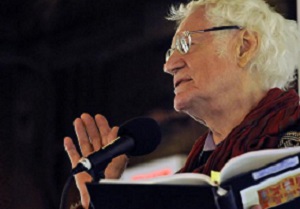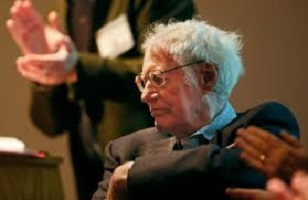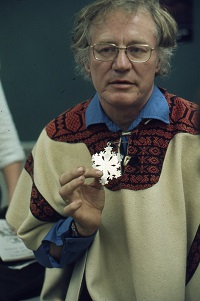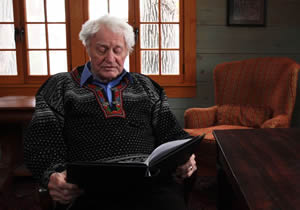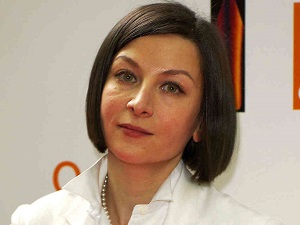De Amerikaanse dichter en schrijver Robert Bly werd geboren op 23 december 1926 in Madison, Minnesota. Zie ook alle tags voor Robert Bly op dit blog.
A Month Of Happiness
A blind horse stands among cherry trees.
And bones shine from cool earth.
The heart leaps
Almost up to the sky! But laments
And filaments pull us back into the dark.
Night takes us. But
A paw
Comes out of the dark
To light the road. I’ll be all right.
I follow my own fiery traces through the night.
Living at the End of Time
There is so much sweetness in children’s voices,
And so much discontent at the end of day,
And so much satisfaction when a train goes by.
I don’t know why the rooster keeps crying,
Nor why elephants keep raising their trunks,
Nor why Hawthorne kept hearing trains at night.
A handsome child is a gift from God,
And a friend is a vein in the back of the hand,
And a wound is an inheritance from the wind.
Some say we are living at the end of time,
But I believe a thousand pagan ministers
Will arrive tomorrow to baptize the wind.
There’s nothing we need to do about John. The Baptist
Has been laying his hands on earth for so long
That the well water is sweet for a hundred miles.
It’s all right if we don’t know what the rooster
Is saying in the middle of the night, nor why we feel
So much satisfaction when a train goes by.
Awakening
We are approaching sleep: the chestnut blossoms in the mind
Mingle with thoughts of pain
And the long roots of barley, bitterness
As of the oak roots staining the waters dark
In Louisiana, the wet streets soaked with rain
And sodden blossoms; out of this
We have come, a tunnel softly hurtling into darkness.
The storm is coming. The small farmhouse in Minnesota
Is hardly strong enough for the wind.
Darkness, darkness in grass, darkness in trees.
Even the water in wells trembles.
Bodies give off darkness, and chrysanthemums
Are dark, and horses, who are bearing great loads of hay
To the deep barns where the dark air is moving from corners.
Lincoln’s statue, and the traffic.
From the long past Into the long present
A bird, forgotten in these troubles, warbling,
As the great wheel turns around, grinding
The living in water.
Washing, continual washing, in water now stained
With blossoms and rotting logs,
Cries, half-muffled, from beneath the earth, the living awakened
at last like the dead.
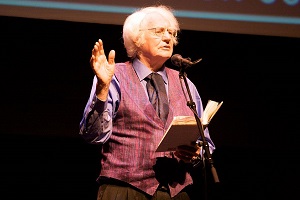
Robert Bly (Madison, 23 december 1926)
De Nederlandse dichter en schrijver Hans Tentije (pseudoniem van Johann Krämer) werd geboren in Beverwijk op 23 december 1944. Zie ook alle tags voor Hans Tentije op dit blog.
Orvieto
Een slingerende weg en haarspeldscherpe
lussen tillen langs brokkelige, overgroeide weringen
het tufstenen plateau hoger en hoger, tot voor de poorten
van een later in de middag weer ontwaakte stad
voor de kathedraal sluit je vol ongeloof
je ogen even en over je oogleden strijkt zijn schittering
het goud van een heel verleden uit
getemperd, wijngeel licht valt
door wat marmeren triten lijken, met een nervatuur
van verkoolde bliksemschichten, van eeuwen terug geronnen
levenslopen, van vloedlijnen, opgestuwd
en onderaards nagolvend bloed dat in gebergten
strandde, zich daar begroef –
iemand brengt een grafstuk, vol overdadig
groen en aronskelken, naar de zijkapel, waar hardop, iets
te loslippig bidden zelfs verboden is
een lijkwagen draait met hangende vaantjes
het domplein op, verspilt zijn enorme motorvermogen
aan het vervoer van een simpele kist, het requiem
zal dadelijk worden opgedragen
vier pilasters laten, door druivenranken
en acanthusblad omlijst, een reeks uitgehouwen
bijbelse taferelen zien – bij de jongste dag zoek je je gezicht
tussen dat van de vele, vele verdoemden –
je vindt het niet, vooralsnog
Semana tragica
Onderkruipers van de staking bemanden de trams
de trams van Barcelona, die later op de dag massaal
gekanteld zouden worden, meestal ver van de smorgens vroeg
nog uitgeschrobde remises vandaan
looiers en wevers, dokwerkers en werklozen stalen ’t brood
terug uit de ovens, geweren van de handelaars
en vrouwen die niks hadden als armoe, als schimmen van
kinderen, ze veegden hun angst af aan hun schort
wat overbleef waren afbrokkelende barrikaden
kerken en kloosters in brand gestoken
o, zoveel warmer dan al die geile kaarsen daar
druipend voor een madonna-beeld, een schitterend
gezicht vanaf Montjuich
lijken werden opgegraven, alsof er in de straten
niet genoeg van waren; verkleed in geplunderde priestergewaden
renden er mensen door een uitgestorven stad
toen kwamen de troepen want macht eist altijd bloed
tragiese eeuw waarin revoluties zo verlopen
fluweel van woorden over alles, steeds dunner mettertijd
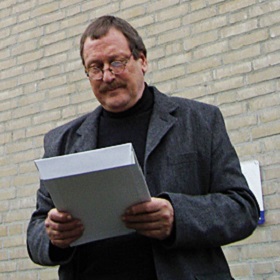
Hans Tentije (Beverwijk, 23 december 1944)
De Nederlandse dichter, schrijver en vertaler Hans Kloos werd geboren in Baarn op 23 december 1960. Zie ook alle tags voor Hans Kloos op dit blog.
Een psalm
Er is me veel
over je verteld.
Dat deden ze goed.
Er is me vaak
verteld dat jij dat ook was,
goed. Er is me veel
bijgebleven; van soep en kwartels,
lemen voeten en een kraaiende haan,
van het licht dat er was
toen jij zei dat het er moest zijn.
Er is me veel verteld.
En zo ben ik
in je gaan geloven.
Dat deed ik goed.
En zo ging ik
je zien, dat je god was,
goed. En zo zag ik
je in nachten van het bange kind,
lichtend water en een boerend hert,
in het licht dat er was
toen ik keek naar mensen bij een bushalte.
Zo ben ik gaan geloven.
En zo ben jij
een leven gaan leiden
in mij. Dat ging goed.
En zo ben jij
groot geworden, groter dan ik,
God. En zo werd je
almachtig, de vader van het bange kind,
levend water en een kraaiende haan
en het licht dat er was
toen ik vroeg of jij met me zou zijn.
Zo ben jij een leven gaan leiden.
En zo ben ik
in jou klein geworden.
Dat ging niet goed.
En ik werd zo
weinig dat jij vlees werd,
woord. En zo ben ik
opgegaan in het zwijgen van het bange kind,
stenen tafelen en het kraaien van een haan,
in het licht dat er was
toen jij zei dat ik stil moest zijn.
Zo ben ik klein geworden.
En toen ben ik
uit je opgestaan.
Dat deed pijn.
En toen ging ik
me zien, dat ik alleen was,
vlees. En zo zag ik
me in hoofd, schouders, knie en teen,
volle handen en een kraaiend kruis,
in het licht dat er was
toen ik keek naar de zon op mijn voeten.
Zo ben ik opgestaan.
En ik heb veel
over je verteld.
Dat doe ik goed.
En ik heb vaak
verteld dat jij er niet was,
alleen. En ik heb veel
overgehouden; soep en kwartels,
hemelvoeten en een kraaiende haan
en het licht dat er is
als ik vertel van mensen bij een bushalte.
Zo ben jij mijn verhaal geworden.
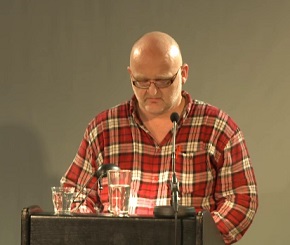
Hans Kloos (Baarn, 23 december 1960)
De Britse dichteres en toneelschrijfster Carol Ann Duffy werd geboren in een rooms-katholiek gezin in de Gorbals, een arm deel van Glasgow, op 23 december 1955. Zie ook alle tags voor Carol Ann Duffy op dit blog.
Words, Wide Night
Somewhere on the other side of this wide night
and the distance between us, I am thinking of you.
The room is turning slowly away from the moon.
This is pleasurable. Or shall I cross that out and say
it is sad? In one of the tenses I singing
an impossible song of desire that you cannot hear.
La lala la. See? I close my eyes and imagine the dark hills I would have to cross
to reach you. For I am in love with you
and this is what it is like or what it is like in words.
Prayer
Some days, although we cannot pray, a prayer
utters itself. So, a woman will lift
her head from the sieve of her hands and stare
at the minims sung by a tree, a sudden gift.
Some nights, although we are faithless, the truth
enters our hearts, that small familiar pain;
then a man will stand stock-still, hearing his youth
in the distant Latin chanting of a train.
Pray for us now. Grade 1 piano scales
console the lodger looking out across
a Midlands town. Then dusk, and someone calls
a child’s name as though they named their loss.
Darkness outside. Inside, the radio’s prayer –
Rockall. Malin. Dogger. Finisterre.
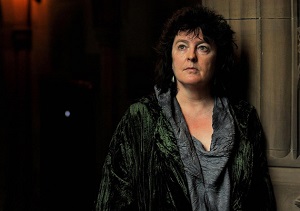
Carol Ann Duffy (Glasgow, 23 december 1955)
De Duitse schrijver, literatuurcriticus en redacteur Volker Jehle werd geboren op 23 december 1954 in Balingen. Zie ook alle tags voor Volker Jehle op dit blog.
Uit: Hildersheimers als Trauzeugen
“Am 9. März, kurz vor 15 Uhr, betraten wir das Tübinger Hotel Krone. Hildesheimers waren noch nicht da. Während wir in der Rezeption warteten, malten wir uns aus, was wir tun sollten, falls sie nicht rechtzeitig kämen – die Hochzeit war auf 15.30 Uhr festgesetzt.
Ein Desaster wäre durchaus möglich gewesen, schließlich waren die beiden nur deshalb in Tübingen, weil Walter Jens sechzigsten Geburtstag hatte, den er aber zweimal feiern mußte, eine Feier, an der Hans Mayer teilnahm, die andere, an der Marcel Reich-Ranicki teilnahm. Nur Hildesheimer nahm an beiden teil, weil er, wie er gesagt hatte, mit beiden konnte, mit Mayer und Reich-Ranicki. Darin lag die Gefahr des Desasters aber gar nicht, sondern darin, daß Hildesheimers zwischen den beiden Feiern für uns Zeit reserviert hatten; wir hatten unsere Hochzeit extra so gelegt.
Doch kurz nach 15 Uhr kamen sie. Silvia Hildesheimer meinte, wir seien ja überpünktlich, Wolfgang Hildesheimer fragte: „Wird schon geheiratet?“
Sie trugen den Ordner mit Reproduktionen seiner Bilder, den ich aus meinem Hildesheimer-Archiv mitgebracht hatte, ins Zimmer hinauf. Er kam als erster wieder herunter und brachte ein flaches Päckchen mit, in rosa Seidenpapier eingeschlagen, nicht ganz quadratisch.
„Das ist mein Hochzeitsgeschenk. Wie finden Sie es?“
Er hielt es hoch, als Querformat.
„Also ich würde sagen, so hat es die beste Wirkung. Finden Sie nicht? Obwohl, Sie, als moderne Menschen, würden es eher so herum hängen.“
Er hielt es als Hochformat und fragte Silvia, die gerade gekommen war: „Was findest du? Sie würden es als moderne Menschen tatsächlich so herum bevorzugen.“
„Du hast recht, es hat so eine ganz eigene Wirkung.“
Ich nahm es und drehte es so um, daß der Tesafilm vorn war: „Wie wäre es so herum?“
Er besah sich‘s aufmerksam. „Tatsächlich – das wäre eine ausgefallene Lösung!“
Wir öffneten das Päckchen, die Zeichnung Beschwörung kam zum Vorschein. Zuerst, bemerkte er, hätte er sich für Unhaltbarer Zustand entschieden gehabt, aber das sei eben doch etwas gewagt, vor allem überm Ehebett, und daß es dorthin gehängt werde, sei selbstverständlich. Dann füllte er den Trauzeugenzettel aus, schrieb bei sich „Schriftsteller“ und bei Silvia „Malerin“.
Zu ihr: „Das gibt dir Auftrieb.“ Zu uns: „Sie hat nämlich ein Bild begonnen, das dieses Jahr noch fertig werden könnte.“ Ohne Pause: „Haben Sie eigentlich schon Namen für das Kind ausgewählt?“
Wir zögerten. Die Namen hatten wir noch niemandem gesagt. „Für ein Mädchen Ulrike, für einen Buben Martin.“
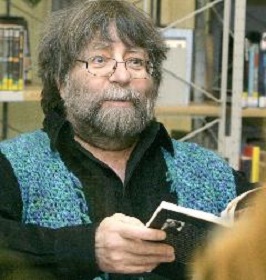
Volker Jehle (Balingen, 23 december 1954)
De Britse schrijver Tim Fountain werd geboren op 23 december 1967 in Dewsbury, West Yorkshire. Zie ook alle tags voor Tim Fountain op dit blog.
Uit: Dandy In The Underworld
“Of all the sexual perversions I find monogamy the most un-natural. In my opinion if you say you are enjoying sex with the same person after a couple of years you’re either a liar or you’re on something. I mean even though the Ivy serves perfect Shepherds pie it doesn’t stop one occasionally craving a visit to the Wolseley does it? Variety is the spice of life after all and love is merely the delusion that one person differs from another. Were Ito remain monogamous I would make one woman happy but all the rest of the women in the world unhappy — what right have I to do that? You see I think sex has absolutely nothing to do with morals, it’s a compulsion, like murder. I’ve no doubt Henrietta will succumb to my charms today after a nice plummy Claret.
He notices a scarf on the floor.
Look, she left her scarf.
He picks it up and places it over the back of his throne.
I’ll just place it there and then after lunch she can come and collect it.
He goes to the windows and throws back the shutters, light floods in to reveal his full studio in all its glory. There is a desk and chair downstage right. On a wall is a gun mounted on velvet in a picture frame. Downstage left there is his throne. There is a painting upstage centre on an easel and covered in a sheet. Behind it on the back wall is a kind of shrine to St Sebastian. There are hundreds of photographs and pieces of publicity material dedicated to him. Welcome to the strong sad kingdom of self. (He laughs at himself) I subscribe to the Quentin Crisp school of home decoration: You must have nothing around you that does not express the kind of person you have decided to become. I’m aiming to be a self-absorbed twat — after all it takes so much finesse to fall in love with yourself. But actually I have to be surrounded by my press cuttings if I am to discover who I truly am. I’m a controversial figure. People either dislike me or hate me. This was The News of the Worldwhen I crucified myself in the Phillipines. Pointing to a front page of the News of the World pinned on the wall. It reads. ‘Art freak crucifies himself. Jesus died to save humanity. I did it to save my career. In my opinion neither of us had much success.”
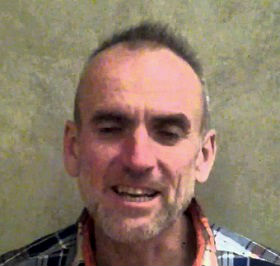
Tim Fountain (Dewsbury, 23 december 1967)
De Amerikaans schrijfster Donna Tartt werd geboren in Greenwood, Mississippi, op 23 december 1963. Zie ook alle tags voor Donna Tart op dit blog.
Uit: The Secret History
“Does such a thing as “the fatal flaw,” that showy dark crack running down the middle of a life, exist outside literature? I used to think it didn’t. Now I think it does. And I think that mine is this: a morbid longing for the picturesque at all costs.
A moi. L’histoire d’une de mes folies.
My name is Richard Papen. I am twenty-eight years old and I had never seen New England or Hampden College until I was nineteen. I am a Californian by birth and also, I have recently discovered, by nature. The last is something I admit only now, after the fact. Not that it matters.
I grew up in Plano, a small silicon village in the north. No sisters, no brothers. My father ran a gas station and my mother stayed at home until I got older and times got tighter and she went to work, answering phones in the office of one of the big chip factories outside San Jose.
Plano. The word conjures up drive-ins, tract homes, waves of heat rising from the blacktop. My years there created for me an expendable past, disposable as a plastic cup. Which I suppose was a very great gift, in a way. On leaving home I was able to fabricate a new and far more satisfying history, full of striking, simplistic environmental influences; a colorful past, easily accessible to strangers.
The dazzle of this fictive childhood—full of swimming pools and orange groves and dissolute, charming show-biz parents—has all but eclipsed the drab original. In fact, when I think about my real childhood I am unable to recall much about it at all except a sad jumble of objects: the sneakers I wore year-round; coloring books and comics from the supermarket; little of interest, less of beauty. I was quiet, tall for my age, prone to freckles. I didn’t have many friends but whether this was due to choice or circumstance I do not now know. I did well in school, it seems, but not exceptionally well; I liked to read—Tom Swift, the Tolkien books—but also to watch television, which I did plenty of, lying on the carpet of our empty living room in the long dull afternoons after school.
I honestly can’t remember much else about those years except a certain mood that permeated most of them, a melancholy feeling that I associate with watching “The Wonderful World of Disney” on Sunday nights. Sunday was a sad day—early to bed, school the next morning, I was constantly worried my homework was wrong—but as I watched the fireworks go off in the night sky, over the floodlit castles of Disneyland, I was consumed by a more general sense of dread, of imprisonment within the dreary round of school and home: circumstances which, to me at least, presented sound empirical argument for gloom. My father was mean, and our house ugly, and my mother didn’t pay much attention to me; my clothes were cheap and my haircut too short and no one at school seemed to like me that much; and since all this had been true for as long as I could remember, I felt things would doubtless continue in this depressing vein as far as I could foresee. In short: I felt my existence was tainted, in some subtle but essential way.”
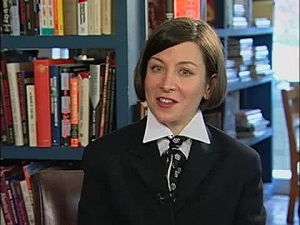
Donna Tartt (Greenwood, 23 december 1963)
Zie voor nog meer schrijvers van de 23e december ook mijn vorige twee blogs van vandaag.

